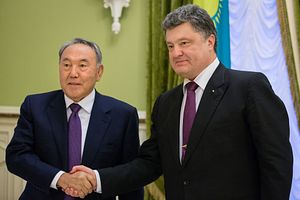Friday, during Ukrainian President Petro Poroshenko’s official visit to Kazakhstan, he met with his counterpart Nursultan Nazarbayev. In a joint statement, the two leaders committed to strengthening cooperation in trade, business, energy, agriculture, and other areas of mutual interest. Poroshenko also thanked Nazarbayev for his “firm and unwavering support for Ukraine’s territorial integrity and sovereignty within the internationally recognized borders.”
Nazarbayev has staked out a fairly neutral position between his country’s closest partner, Russia, and Ukraine, where Russian-backed separatists battle the European-supported government forces in the country’s east. In February 2014, Russia annexed Crimea, an internationally-recognized piece of Ukraine. The move was interpreted by some to be not just a land-grab, but a warning to other former Soviet states. Combined with comments made by Russian President Vladimir Putin in August 2014 that before 1991, “Kazakhs had never had statehood,” the idea that Russia could do to Kazakhstan what it had done to Ukraine understandably caused concern.
Kazakhstan’s firm reaction to Putin’s remarks (the country hurriedly organized celebrations of Kazakhstan’s 550th anniversary of being a state this year) and repeated statements supporting a peaceful, negotiated solution to the Ukraine mess can be seen as pushing back on Russia. Poroshenko’s visit came as Kazakhstan kicked off another of its 550th anniversary celebrations this year, this one in the city of Taraz. Nazarbayev, according to the Astana Times, in televised remarks emphasized Kazakhstan’s stability and the international respect it derives from serving as conflict mediator. As with previous statements, Nazarbayev emphasized the unity of the Kazakh people.
But the Kazakh-Russian relationship is dynamic and these instances of pushback are balanced by Nazarbayev’s many meetings with Putin, the Eurasian Economic Union they launched together this year and the close linkages of Kazakhstan and Russia in not just economic terms, but historical, social, and cultural terms as well. The relationship is vital to Kazakhstan.
Still, Kazakhstan’s ambition to be an international player is, in part, predicated on acting independently. Nazarbayev’s repeated position on the Ukraine-Russia debacle is that the Minsk agreements — which call for a ceasefire, deescalation, and an exit of armed groups from the areas in conflict among other things — should be implemented. Rooting for a peaceful, negotiated settlement is not a controversial position in either Kiev or Moscow. As long as Nazarbayev keeps away from specifics he’s safe — and both Putin and Poroshenko seem happy to let Nazarbayev play the role of intermediary. This facet of Kazakhstan’s grand plan — to act as a diplomatic playmaker — is evident in not just Astana’s push for settlement of the Ukraine issue, but also its two rounds of negotiations between Syrian rebel groups. The outcomes of these meetings are largely irrelevant to the fact that Kazakhstan is increasingly seen as a diplomatic broker, a convener if not a solver.
Poroshenko told journalists that Kazakhstan is a “window to Asia” for Ukraine, and expressed the hope that Ukraine, for Kazakhstan, would be seen as a “window to Europe.” Kazakhstan, however, is more of a prism than a window, reflecting back at every partner a different facet — the one most likely to entice them.

































